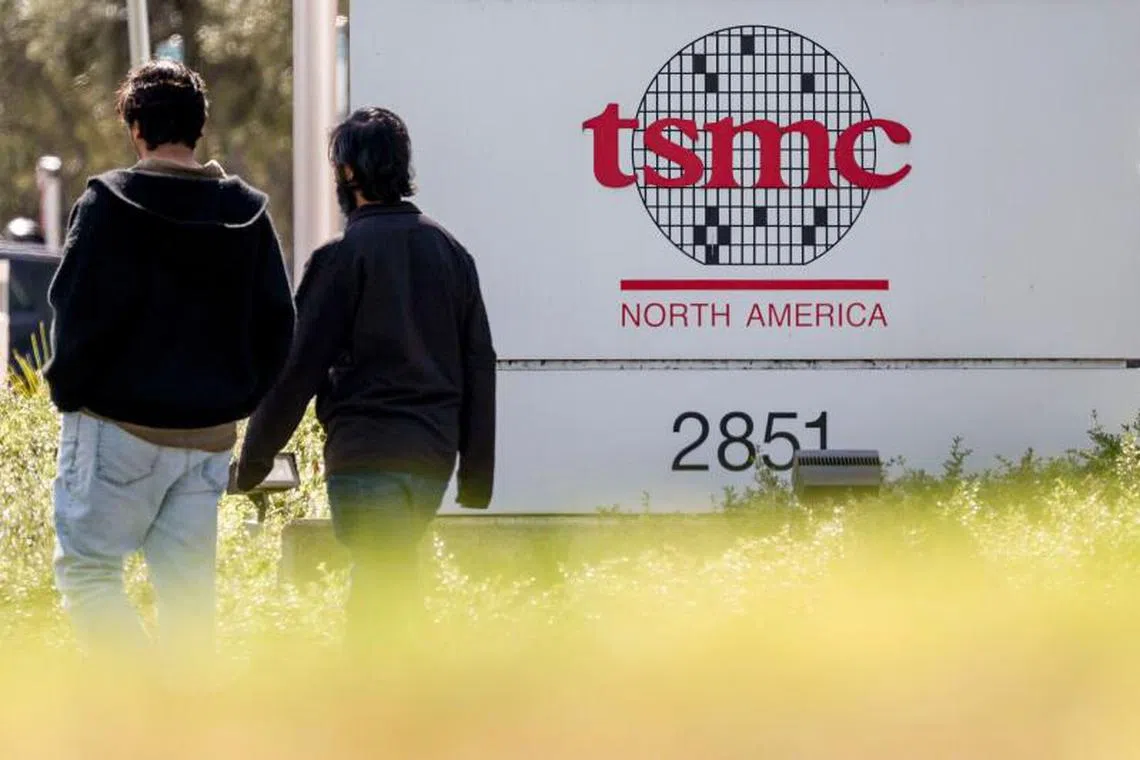Trump and Taiwan’s chipmaker TSMC announce $135 billion plan to build five new US factories
Sign up now: Get ST's newsletters delivered to your inbox

US President Donald Trump, flanked by TSMC Chairman C.C. Wei, announces the investment plan at the While House.
PHOTO: REUTERS
Follow topic:
WASHINGTON - Taiwanese semiconductor company TSMC plans to make a fresh US$100 billion investment (S$135 billion) in the United States that would involve building five additional chips facilities in the country in coming years, its CEO announced with US President Donald Trump on March 3.
Taiwan Semiconductor Manufacturing Co, the world’s largest contract chipmaker and a leading supplier to major US hardware manufacturers, announced the plan as CEO C.C. Wei met with Mr Trump at the White House.
“We must be able to build the chips and semiconductors that we need right here,” Mr Trump said. “It’s a matter of national security for us.”
TSMC said the expansion includes plans for three new chips fabrication plants, two advanced packaging facilities and a major R&D centre.
The US$100 billion outlay, which would boost domestic production and make the United States less reliant on semiconductors made in Asia, is in addition to a major prior investment announcement. TSMC agreed in April to expand its planned US investment by US$25 billion to US$65 billion and to add a third Arizona factory by 2030.
With his Nov 5 election victory largely driven by voters’ economic concerns, Mr Trump has stepped up efforts to bolster investments in domestic industries to create jobs. The TSMC announcement is the latest in a string of such developments.
In February, Apple said it would invest US$500 billion promised multi-billion dollar investments
TSMC said on March 3 it looks “forward to discussing our shared vision for innovation and growth in the semiconductor industry, as well as exploring ways to bolster the technology sector along with our customers.”
The US Commerce Department under then President Joe Biden finalised a US$6.6 billion (S$8.9 billion) government subsidy in November for TSMC’s US unit for semiconductor production in Phoenix, Arizona.
Mr Biden signed the Chips and Science Act legislation in 2022 to provide US$52.7 billion in subsidies for American semiconductor production and research.
Commerce Secretary Howard Lutnick said TSMC and other companies are investing in the United States and want to avoid Mr Trump’s new tariffs. The US$100 billion would be eligible for a 25 per cent manufacturing investment tax credit under the 2022 law.

TSMC says the expansion includes plans for three new chips fabrication plants, two advanced packaging facilities and a major R&D centre.
PHOTO: BLOOMBERG
Taiwan’s dominant position as a maker of chips used in technology from cellphones and cars to fighter jets has sparked concerns of over-reliance on the island, especially as China ramps up pressure to assert its sovereignty claims.
China claims Taiwan as its territory, but the democratically elected government in Taipei rejects Beijing’s sovereignty claims. Under Mr Biden, the Commerce Department convinced all five leading-edge semiconductor firms to locate factories in the US as part of the programme to address national security risks from imported chips.
Mr Lutnick told lawmakers in February that the programme was “an excellent down payment” to rebuild the sector, but he has declined to commit grants that have already been approved by the department, saying he wanted to “read them and analyse them and understand them.”
A TSMC spokesperson said in February the company had received US$1.5 billion in Chips Act money before the new administration came in as per the milestone terms of its agreement.
TSMC in 2024 agreed to produce the world’s most advanced 2-nanometer technology at its second Arizona factory expected to begin production in 2028. TSMC also agreed to use its most advanced chip manufacturing technology called “A16“ in Arizona. TSMC has already begun producing advanced four-nanometer chips for US customers in Arizona.
The TSMC award included up to US$5 billion in low-cost government loans. REUTERS

